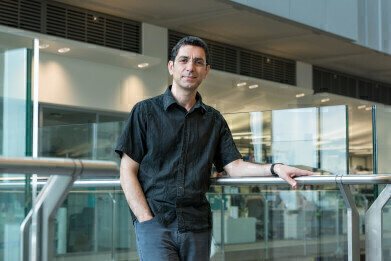-
 Crick Group Leader George Kassiotis
Crick Group Leader George Kassiotis
News & Views
Cancer Vaccine Researchers win Crick Prize
Feb 19 2019
The 2018 Sir David Cooksey Prize in Translation, awarded annually to Crick researchers, was presented to Crick group leader George Kassiotis, along with lab member Jan Attig, George Young of the Stoye Lab and Crick entrepreneur in residence Houman Ashrafian, for their discovery of a new class of cancer-specific antigens made by a group of ancient viruses which have become part of the human genome. Called human endogenous retroviruses (HERVs), the prize recognised the teams’ work in developing these antigens as candidates for cancer vaccines.
The research also led to the creation of a spinout company, ErVaxx, with the aim of testing the cancer-specific ERVs as cancer vaccine targets. The company, which has since attracted £13m of funding, is validating the concept and working toward vaccine development.
On announcing the award, Sir David Cooksey said: “This year’s winners are a group who have built upon their tremendous science and worked in an interdisciplinary way to create a company with the potential to impact cancer treatment in the future.
“Their work demonstrates that the Crick, with its novel translational support approach, is a fantastic place for innovation, enabling its scientists to achieve the Crick’s aims.”
The Cooksey prize aims to recognise and celebrate individuals and teams contributing to the Crick translation strategy to share excellence in translation, create awareness of translation work at the Crick and inspire others. The winning team receives £10,000 for their research in addition to a £2,000 cash prize.
“We had five exceptional teams nominated for this year’s flagship prize, and choosing a winner was incredibly difficult,” said Veronique Birault, Head of the Crick’s Translation team.
Given the quality of the nominations a runner-up team was also selected. Led by Romeo Raczin Andreas Schaefer’s Neurophysiology of Behaviour Laboratory, the team have built innovative bioelectronics technology, which contributes to understanding mammalian brain function.
“This team are an excellent example of visualising the broad translational opportunity of a technology developed from their lab’s basic research question; of driving the research enabling instrument; and of collaborating widely outside of the Crick to expand their thinking on the wider therapeutic impact,” said Veronique.
Digital Edition
Lab Asia 31.2 April 2024
April 2024
In This Edition Chromatography Articles - Approaches to troubleshooting an SPE method for the analysis of oligonucleotides (pt i) - High-precision liquid flow processes demand full fluidic c...
View all digital editions
Events
Apr 22 2024 Marrakech, Morroco
Making Pharmaceuticals Exhibition & Conference
Apr 23 2024 Coventry, UK
Apr 23 2024 Kintex, South Korea
Apr 23 2024 Seoul, South Korea
Apr 24 2024 Jakarta, Indonesia







.jpg)









